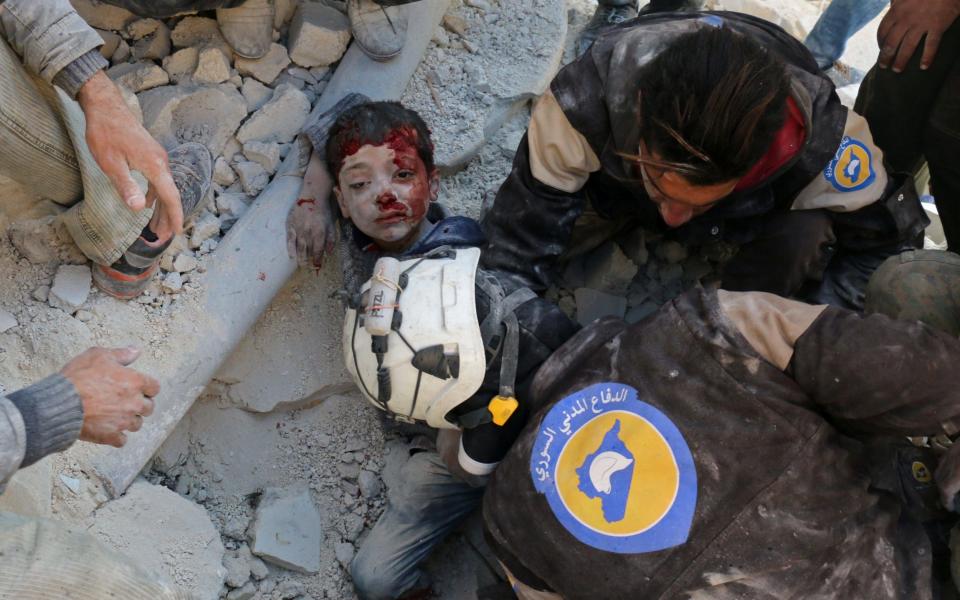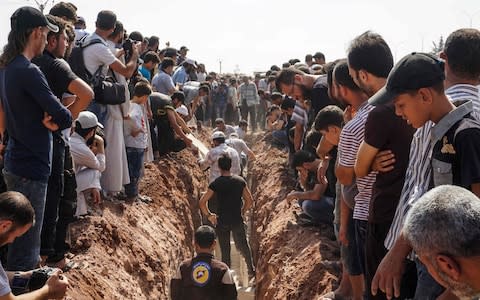The social media warning system saving lives in Syria

The warning sent to Abdulkarim al-Ismail’s Facebook came just before the warplanes would fly overhead and dropped their load. He knew he had eight minutes at most to move his wife and two children down the basement.
When the thud came, it was close, closer than he had calculated. The building rattled and the windows shattered.
His neighbour down the road had not seen the message - the crucial window between life and death - and was killed in the front room of his home.
Mr Ismail, a teacher in the city of Saraqeb in the northern Syrian province of Idlib - the last-remaining rebel-held territory in the country - has for years relied on the warning system to stay alive.
The technology, developed by the start-up Hala Systems, works by detecting aircraft using remote sensors on the ground in Idlib and machine-learning algorithms, which look at the speed of an aircraft and its usual flight pattern.

It then sends alerts via messaging apps Telegram, What’sApp and Facebook to “White Helmets” civil defence workers and civilians, as well as setting off air raid sirens in the areas likely to be affected.
“The message tells you everything, from where the warplanes took off, to where they think they will hit, to how long they will be and where the danger areas are,” Mr Ismail, 38, told The Telegraph. “You can even find out if they are Russian or if they are Syrian.”
The technology has been funded in part by the British government, which says it has already helped warn more than two million people since it was launched three years ago and is estimated to have reduced casualties by up to 27 per cent in areas under heavy bombardment.
“Civilians in Syria were already providing a sort of human warning system before our technology, acting ad hoc spotting planes and sending messages to their communities,” said John Jaeger, chief executive of Hala, likening it to the British farmers who would phone friends in London after spotting Luftwaffe planes during the Second World War.

“What we did is just make this more dependable and more structured,” he told The Telegraph.
“For a long time, people were living in a constant state of terror, too scared to even leave their house in case of an air strike. Obviously it can’t totally remove that fear, but it can make life that bit more bearable.”
There are fears for the opposition-held province of Idlib, where it is thought the Syrian government and its Russian backers are about to launch a large-scale offensive to reclaim it.
Some 2.7 million people are packed into Idlib, which is under the control of a mix of moderate rebels and jihadists.
There is no safe route out, with the province surrounded on three sides by pro-government forces and a closed Turkish border to its north.
“A humanitarian catastrophe in Idlib is avoidable,” Alistair Burt, Minister for the Middle East, said yesterday. “The UK supports the urgent diplomatic efforts being made by Turkey and the UN.
“We call on the Syrian regime and its backers, Russia and Iran, to uphold the ceasefire they have agreed, and to respect international humanitarian law.”

Several thousand people have been killed by Syrian and Russian air strikes during the seven-year war. Both countries stand accused by the United Nations of indiscriminately bombing civilian areas such as schools, hospitals, and civil defence centres.
There have already been at least 37 attacks on health facilities in the Idlib region so far this year.
The targeting of hospitals and clinics has become something of a grim, predictable prelude to the Bashar al-Assad regime’s offensives - a tactic which leaves a population more vulnerable and likely to surrender.
Two-dozen doctors working in Idlib with the Union of Medical Care and Relief Organisations (UOSSM) delivered a letter last month to Jeremy Hunt, the Foreign Secretary, calling for the British government not to turn a blind eye to what is coming.
“I gave a letter to Mr Hunt pleading to him to protect hospitals and civilians from air attacks and the use of chemical weapons,” Hamish de Bretton-Gordon, an adviser to UOSSM, told The Telegraph. “He responded to us saying that they would do all it could to achieve this.
‘If the British government went a step further and also named and shamed the owners of those aircraft conducting the strikes, which are a crime against humanity and illegal under the Geneva Convention and international law.”

 Yahoo News
Yahoo News 